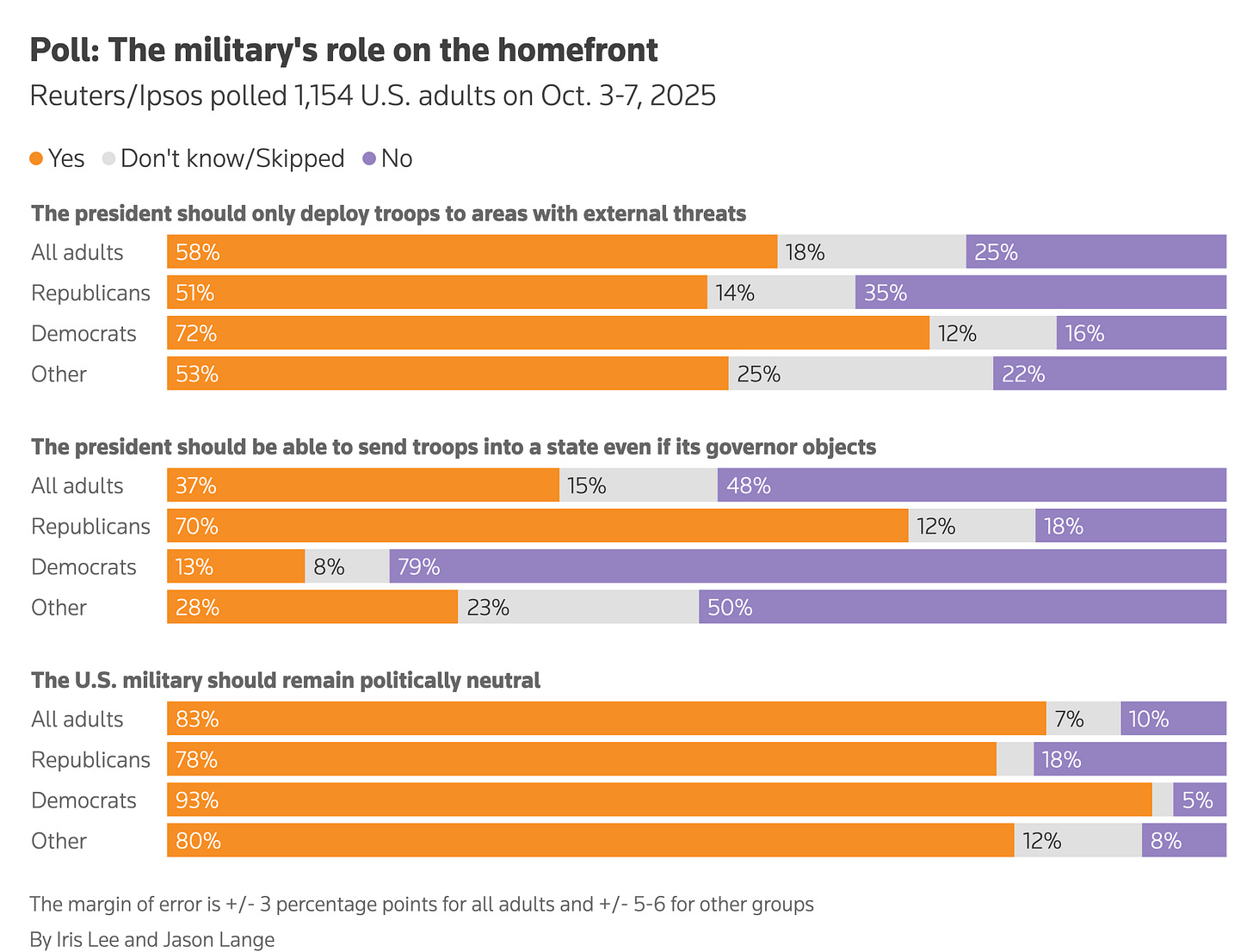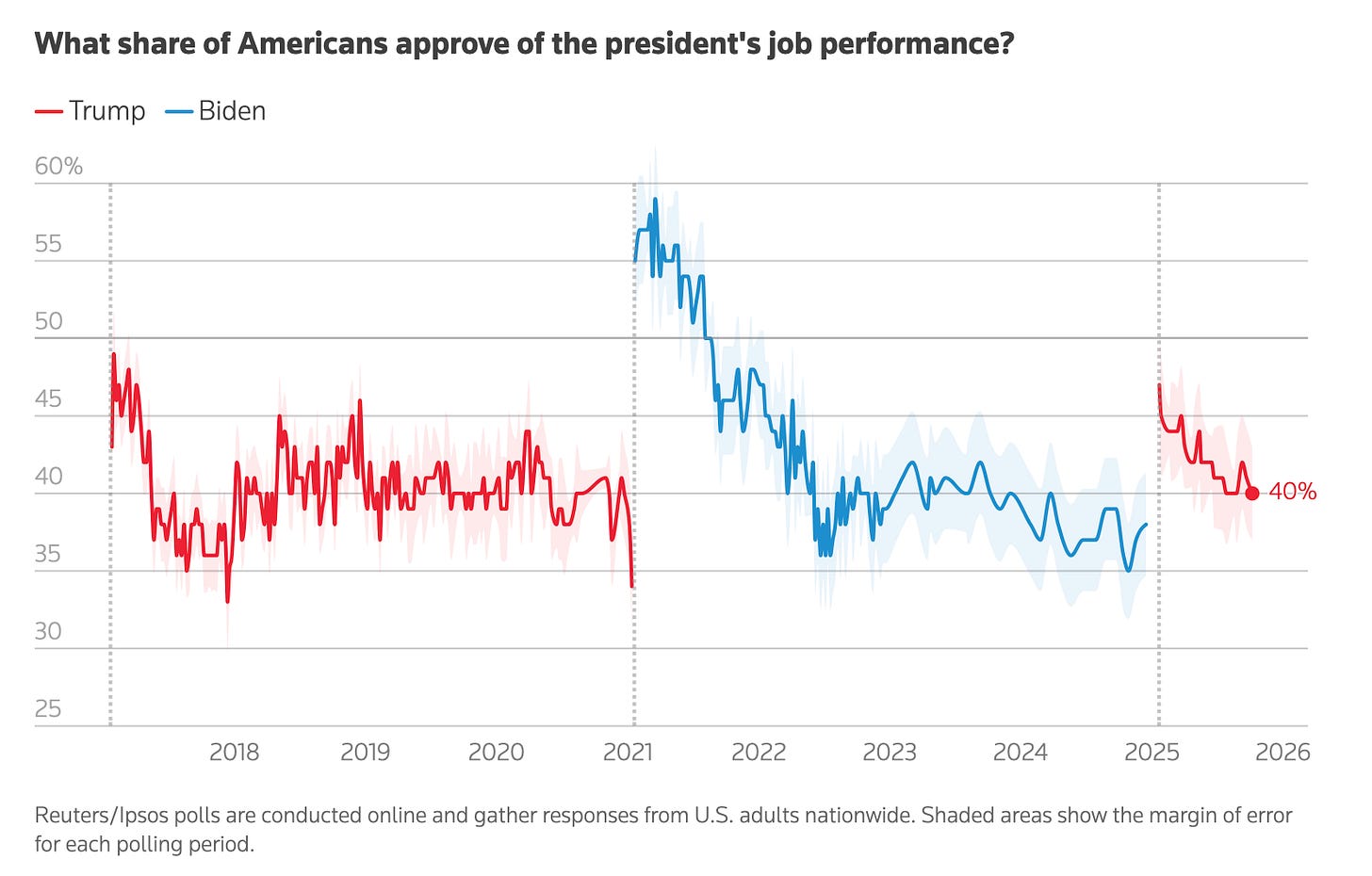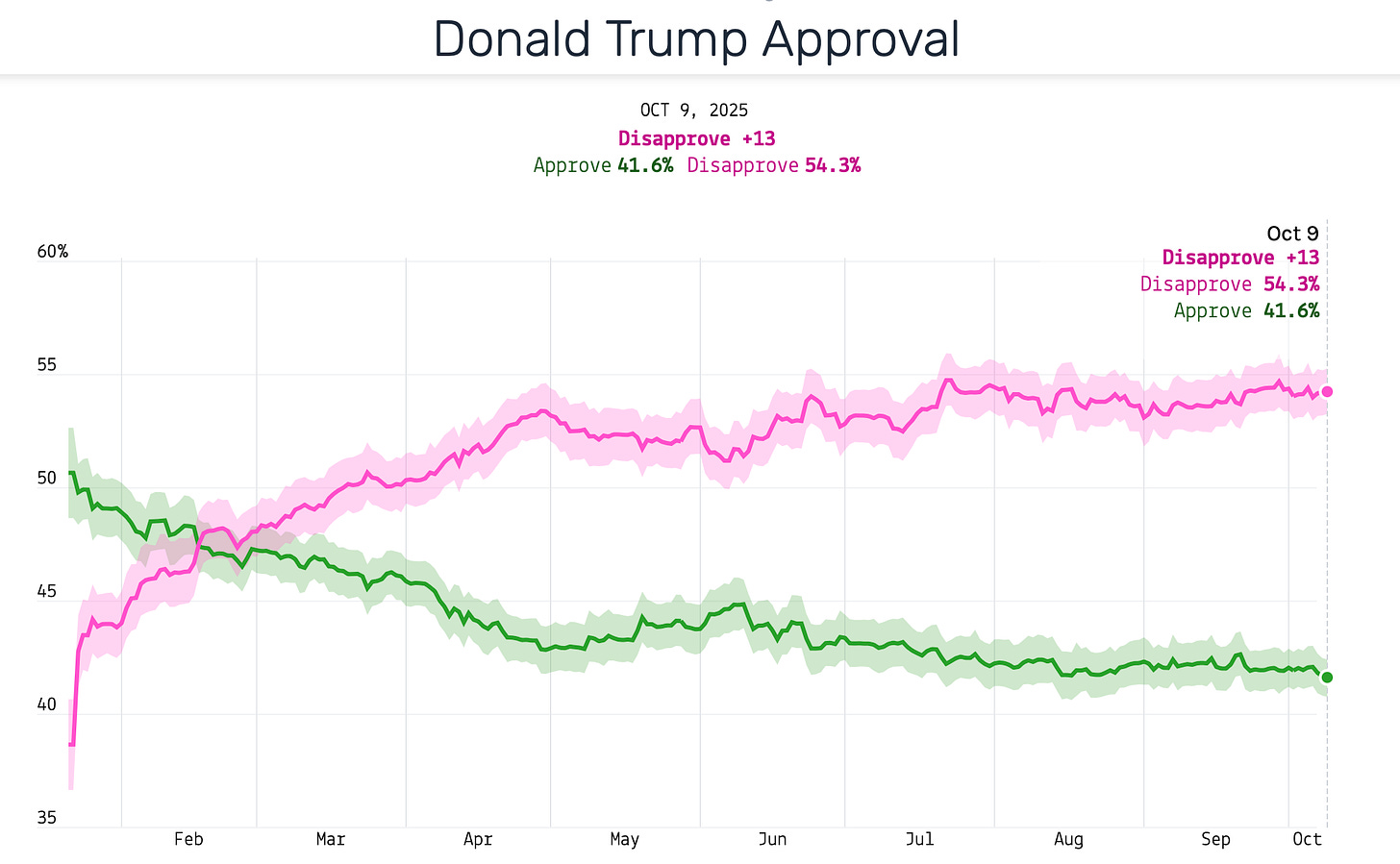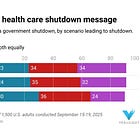A majority of Americans oppose Trump sending the National Guard to Democratic-run cities
The president is defying the will of the people, federal judges, and the Constitution
The big news of the last ~48 hours is that President Donald Trump has helped broker a ceasefire between Israel and Hamas. That’s good news, if it holds.
Yet one of the nice things about owning your own writing business (and having devoted subscribers who support you for what you’re good at) is that you don’t have to write about things you don’t know anything about. I have nothing original to say about the Israel-Palestine conflict. Plus, it’s too early to look for a story in the data — in a few weeks, perhaps, we can revisit Trump’s approval on foreign policy to look for any changes in the trend.
But in the meantime, I have decided to cover the big domestic news story instead: Trump’s continued violations of federal law by deploying the National Guard to blue cities without (1) the consent of their governors or (2) clear evidence of rebellion against the U.S. government.
There are a lot of interesting questions about this issue, such as: How do voters feel about Trump’s claims and his use of the military? What does the Constitution say about his powers? And how are legislators and the courts reacting?
Answers to these questions, and more, in this week’s Chart of the Week.
Trump is living in a fairy tale world
President Donald Trump claimed this week that Portland, Oregon — where he has ordered the deployment of National Guard troops to “support U.S. Immigration and Customs Enforcement and other federal personnel performing official duties” — is “burning to the ground” and “war-ravaged.” He says the city “doesn’t even have stores anymore“ and is in open rebellion against the U.S. federal government. He says that if you watch TV coverage of Portland, there’s crime everywhere and the city is burning to the ground.
The president has also sent several hundred National Guard troops from Texas to Chicago, Illinois, under a similar pretense and without the consent of the state’s Governor, J.B. Pritzker. Trump is now reportedly seriously considering invoking the Insurrection Act, a 19th-century law that gives the president the power to deploy the military domestically to quell insurrection.
Trump is best described as living in a fairy tale world, a completely manufactured reality where immigrants and leftists are at war with the government, and he has absolute authority to deal with them as he wishes.
But his statements about Portland and Chicago are completely divorced from reality — a federal judge on Thursday night even said as much. U.S. District Judge April Perry barred the president from deploying the Illinois and Texas National Guard because, in her words, there is “significant doubt on [The Department of Homeland Security]’s credibility on what is going on in the streets of Chicago.” She said:
Deportations are up. Arrests are up. … The courthouse remains open and always has. Federal laws are being executed. They’re also being broken, as they have been since the beginning of time. There is no evidence that the president is unable, with the regular forces, to execute the laws of the United States.
Trump has even been caught passing along video of arrests in Florida as evidence of unrest in Chicago. On Wednesday, he said J.B. Pritzker, the governor of Illinois, should be thrown in prison for getting in ICE’s way.
What Trump is doing is un-American
The Framers did not intend the president to have such broad powers over federal law enforcement. In Federalist 69, Alexander Hamilton characterizes the powers Trump is now claiming for himself as those of a king, not a president:
The President is to be the “Commander in Chief of the army and navy of the United States, and of the militia of the several States, when called to the actual service of the United States.” [...] the power of the President will resemble equally that of the King of Great-Britain and of the Governor of New-York.
The most material points of difference are these—First; the President will have only the occasional command of such part of the militia of the nation, as by legislative provision may be called into the actual service of the Union. [...] It would amount to nothing more than the supreme command and direction of the military and naval forces, as first General and Admiral of the confederacy; while that of the British King extends to the declaring of war and to the raising and regulating of fleets and armies; all which by the Constitution under consideration would appertain to the Legislature.
And in Federalist 29, Hamilton writes that if deploying the National Guard becomes necessary to suppress insurrections or repel invasions, then the direction of those troops would naturally fall to the president when and if they are called into the service of the United States by Congress.
In other words, the Framers, wary of the influence King George had over the British military, wanted the president only to have the authority to command a national militia, but not exclusively, and not without permission of Congress and state governors, except in rare circumstances.
Americans say Trump is exceeding his powers
People are coming around to Trump’s actions as a concrete violation of these Constitutional principles. On Wednesday, a Reuters/Ipsos poll found that a majority of Americans agreed the president “should only deploy troops to areas with external threats,” and a near-majority (48%) thought the president should not have the power to send troops into a state “even if its governor objects”:
The same poll found Trump’s approval rating among adults falling to 40% — solidly in Trump term 1 territory; 40% was Ipsos’s average approval for Trump from mid-2018 through 2020:
To be fair, this is a little lower than the average poll, but not by much:
And this all matches my polling here for Strength In Numbers. In our September poll, conducted online with Verasight, Trump deploying the National Guard “to cities and states in order to help Immigration and Customs Enforcement identify and deport unauthorized immigrants” was opposed by a margin of 51-37:
For their part, Republicans in Congress seem unusually open to countering Trump on this issue. On Oct. 9, the U.S. Senate nearly passed an amendment to a defense bill that would have restricted the president’s ability to deploy the National Guard. Notably, Bill Cassidy, a Republican Senator from Louisiana, voted in favor of the amendment. The Republican governor of Oklahoma agreed.
Liberty and order
Freedom exists on a spectrum from liberty to order. Too much liberty, and you have anarchy. Too much order, and you have tyranny. The founders feared the latter most of all.
Trump’s manufactured crisis in Portland and Chicago represents a dangerous escalation in presidential overreach — rising levels of order and falling liberty. Another federal judge ruled on Thursday that National Guard troops in Chicago must stop using “excessive brutality” against the press, clergy, and protesters exercising their First Amendment rights.
Congress, the Courts, and the people disagree with his agenda, but the president continues to live in his fairy tale world where reality bends to his will and constitutional constraints don’t apply.
Two questions remain now. First, whether Congress will finally draw a line. Second, whether Trump will initiate a stand-off with the Courts (he could refuse to withdraw the National Guard from Chicago).
The Framers designed our system to prevent exactly this kind of executive power grab. The people seem to understand this. So do (for now) the courts. Will liberty survive Trump?
Support independent political journalism!
Democracy requires a strong fourth estate that holds leaders accountable for abuses of power. The best way to safeguard a strong press is to support independent political analysis. You can support my mission using facts and math to fight for the will of the people by taking out a paid membership to SIN today:








One correction - under "liberty and Order" paragraph 2, you state 'Another federal judge ruled on Thursday that National Guard troops in Chicago must not stop using “excessive brutality” against the press, clergy, and protesters exercising their First Amendment rights. ' implying they must use excessive brutality. I believe it should be 'Another federal judge ruled on Thursday that National Guard troops in Chicago must stop using “excessive brutality” against the press, clergy, and protesters exercising their First Amendment rights. ' i.e. remove the "not" from "must not stop"
Otherwise good write-up of the situation and the polling.
The Reuters/Ipsos poll also repeats a result from CBS/YouGov on Sunday that I found interesting - when polled in the abstract about how they perceived of Democrats, Republicans by a 62-38 margin viewed them as political opponents and not dangerous enemies (Democrats, reasonably, were closer to 50-50 in the reverse), but when an openly political poll that asked about Trump's approval, etc. asked about what people saw as the biggest threat to America, 52% of Republicans said domestic enemies, compared to only 29% who said the economy. In the Reuters poll, the first and third questions are less immediately related to Trump's actions than the second, and Republican respondents are much more amenable to the authoritarian position on that middle question (it also doesn't bode well for further GOP congressional support for limiting the use of the Guard if that's how their base feels on the subject).
It's limited data points, but it gives the impression that Americans are, regardless of party, opposed to political violence in the abstract, but once it relates to Trump directly self-identified Republicans are substantially prepared to become authoritarian. It also ties into your piece from a couple of days ago - does the immediacy of Trump's behavior and one's need to be "loyal" override a baseline opposition to political violence by one's own side? Is it an instinct to normalize? An information bubble and disinformation blitz about current events? All of the above?